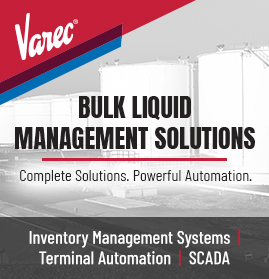When a European tank terminal needed a new infrastructure for its logistics IT, one thing became certain very quickly: it should be a cloud solution. Together with the international software and consulting company Implico, the tank terminal operator quickly found a customised model that covered all of its needs. The new solution is now in operation – and it has proven to be stable, simple, secure and faster than ever before.
The terminal is busy even outside of normal working hours. Large tankers deliver crude oil which is brought to different refineries. Finished products also leave the refineries via ship from the oil terminal. Even in the middle of the night and on weekends, the company must be able to rely on its IT system for loading around the clock.
When the tank terminal could no longer use the IT structure of its service provider, the company needed its own solution. It had two options. “We could have set up the IT on site, which would have involved building a server room and hiring the necessary specialists, among other things,” said the tank terminal’s project manager. “The second option was much more practical for us: we could just use the systems from the cloud.”
This is no longer an unusual approach: While the oil and gas industry was skeptical towards the new model for a long time, numerous companies have now turned to a “cloud first” strategy.
Many possibilities for the cloud infrastructure
The downstream specialists of the Implico Group were hired by the company to handle the infrastructure outsourcing, system hosting and support.
Implico started by presenting various options for establishing the infrastructure. “We own two data centres, both of which we operate ourselves, and we also work with third-party providers of cloud infrastructures, such as Amazon,” explained Stephan Buhre, Managing Partner of Implico. “We offer a number of options for using external server capacity and combining it with the capacity and expertise of Implico.”
Flexible server downtimes
The tank terminal opted for using Amazon Web Services (AWS) as its infrastructure. Implico was hired to manage the cloud services. “Since loading takes place around the clock, seven days a week, the customer needs extremely flexible options for the necessary server downtimes. We can offer this with an external service provider,” Stephan Buhre said.
The implementation started shortly afterwards. Implico created a 1:1 copy on the server of the systems that had been used to date. These include the OpenTAS terminal management system, the associated Oracle database, and the planning software of a third-party provider. Implico also moved the interfaces with the ERP systems of the business partners to the cloud.
The actual migration of the systems to the cloud was completed successfully within just a few hours. Processes at the terminal were hardly affected. “We had planned for a day of downtime to export the database, but in the end it went much faster,” said the project manager. “The systems were unavailable for maybe six hours in total. We could easily fit this between two ship loading procedures.”
Opening the right pipelines
The terminal management system now controls the processes in the tank terminal from the cloud. OpenTAS is connected to the local programmable logic controller (PLC), which is the load computer that controls the field devices. But since the load computer sends legacy signals which the modern terminal management system cannot process, a TCP unit has been installed. This unit is a device comprising a pocket-sized microcomputer and the required software, which has been developed by Implico especially for OpenTAS connectivity. Its job is to translate the signals sent between the legacy field devices and the modern terminal management system.
For example, imagine that diesel needs to be loaded from a tank to a ship. OpenTAS sends all necessary information to the PLC in the form of “movements.” These movements describe how much of which product should flow from where to where. Using this information, the load computer opens certain pipelines so the diesel can be loaded.
No hassle with IT
The cloud solution is very simple for the local team to work with. Other than the hardware for the workstations – PCs, printers, etc. – the company requires no other IT on site and has nothing to worry about. The employees can work on their computers as usual, but now they are accessing the cloud. Experts from Implico handle the management of OpenTAS, including maintenance and updates, while the third-party provider deals with the server. “If we have difficulties, Implico can access the server directly to provide fast support,” the project manager said. “This wasn’t as straightforward before.”
With the new architecture, the solutions are running much faster than before. Another advantage of the cloud: “We have unlimited storage space. We used to occasionally reach the limit and had to expand our storage. Now we don’t have to deal with issues like this anymore,” the project manager said.
Security is the top priority, however. The new system meets the highest demands as the tank terminal uses a private network with no external access. Data is exchanged in encrypted form, and the firewalls and virus protection are state of the art. The customer is extremely positive about the new system: “We are very pleased with the service we’re getting for our money. Everything is stable, and we don’t have to spare any thought for our IT – because it’s in good hands.”
For more information, visit: www.implico.com
24th August 2018









